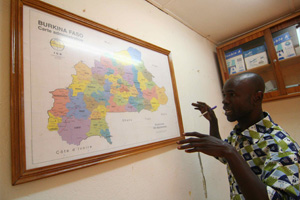
OUAGADOUGOU, Burkina Faso — Violence in Mali has created unexpected challenges to humanitarian efforts in neighboring West African countries.
A radical Islamist military coup in March displaced more than 300,000 people from northern Mali, many seeking refuge in Niger and Burkina Faso. Drought and a food crisis have plagued these countries for the last several years.

Kassoum Outtara, an emergency specialist with Catholic Relief Services in West Africa, said that Burkina Faso began receiving waves of refugees as early as February. He said the rebels in northern Mali want to establish a separate state governed by a strict adherence to Sharia law, the systematized Islamic moral code.
This fall, radical Islamists hacked off the hands and feet of a group of men suspected of theft. Yet, Outtara is most concerned with the rebels’ involvement in trafficking. Mali security was unable to control the area, Outtara said, because the rebels had more firepower.
“At the beginning, [refugees] came with nothing,” he said, adding that it takes several days to cross the border. Refugees fled in such fear that they left without many belongings.
“It was very difficult to get water,” Outtara said. “Food has been the main problem. They couldn’t carry food with them, and even if they had money, there was nowhere to buy food.”
At first, local communities offered millet. But the refugees have since become a burden on the drought-plagued farmers.
Catholic Relief Services has built latrines, showers and wells and distributed food and hundreds of tents. They’ve also engaged in peace-building efforts between host and refugee communities, according to Abbey Johnson of CRS Burkina Faso.
“We’re setting ourselves up for longer-term outreach, but we don’t have the funding yet,” she said. Johnson said refugees have called the food distributions “life saving.” Estimates put the number of refugees between 35,000-43,000 in Burkina Faso.
Bill Restetter, CRS’ country representative in Niger, said the refugees are receiving resources previously allocated elsewhere.
“We anticipated the food insecurity,” he said. “We didn’t anticipate the refugees from Mali.”
Niamey Archbishop Michel Christian Catatéguy works closely with Caritas Niger. Caritas and the archdiocese are using their resources to deal with the situation in Mali.
“We’re expecting a lot more refugees and terrorist acts,” he said. Yet, Archbishop Catatéguy said Muslims and Christians and the many ethnic groups in Niger have a peaceful relationship.
“That’s not the case in Mali,” he said. “The more united we are, the stronger we will be to counter what’s happening in Mali. If war comes, like all wars, people will flee.”
The divisions between the refugees are evident, according to Outtara in Burkina Faso. He described the refugees as moderate Muslims fleeing radical Islamists.
The refugees are divided between Arab, Tuareg and Bella Malians. The Tuareg will often have Bella Malians as slaves, which creates a dilemma for relief efforts.
“Even in the camps you’ll see practices that are not commendable,” Outtara said. “Someone will give their food ration to their master.”
Dominique Bangré, CRS Burkina Faso’s country representative, said efforts with Mali refugees have thus far relied on private funding. He also noted kidnappings at the camps.
“Some say the war will be short,” he said. “I don’t know. There are a lot of players involved.”





